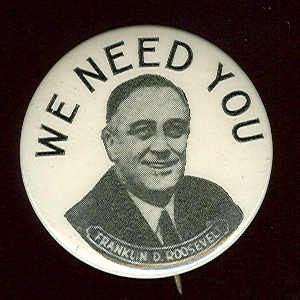I have been so busy reforming the nation (during the Progressive Era) and then learning all the new dances of the 1920s (hat tip to Terra Schultz for help locating this video on the “Black Bottom”) that I haven’t been able to show our blog the attention she deserves. So I come to you in a moment of depression, and not any old depression – the Great Depression. You know the one: Dust Bowl, buying on margin, Herbert Hoover being … well, Herbert Hoover.
When I TAed this class for Prof. Mark W. Summers at the University of Kentucky, he had a slide show of photographs from the 1930s and set it to “Brother, Can You Spare a Dime.” It was beautiful and gripping. But I worry about the dramatic saga approach to teaching the Great Depression. In part, it sets up a villain-hero dynamic where FDR invariably becomes the god who didn’t fail. For instance, we watched this film on the 1930s that uses newsreel from the era. FDR is hero; Long is a villain; and the New Deal pretty much won the day. Of course, there are some truths here. FDR did win 4 presidential elections, but “good New Deal” versus “bad business folks” probably sounds to our students like more “liberal propaganda” thrown at them from “liberal professors” … the kind that Glenn Beck disdains.
So how do we teach the Great Depression without heroes and villains, without drama that shifts seems to have clear political undertones?




I don’t know if this works (i.e. if the students perceive it) but I tend to hinge the New Deal on two perspectives that unfold over the course of the semester. First, I discuss the ND from the perspective of Brinkley’s “End of Reform,” highlighting that the thing ran out of steam, found new life, and then was fatally (according to your p.o.v.) compromised during the WWII years. Second, I frequently call back to the excesses and failures of the ND coalition when discussing 1950s Abundant Society, 1960s Great Society, and the Reagan Revolution. Both approaches stress the failures and contingencies of the ND, and hopefully take the triumphant inevitability off of FDR a bit.